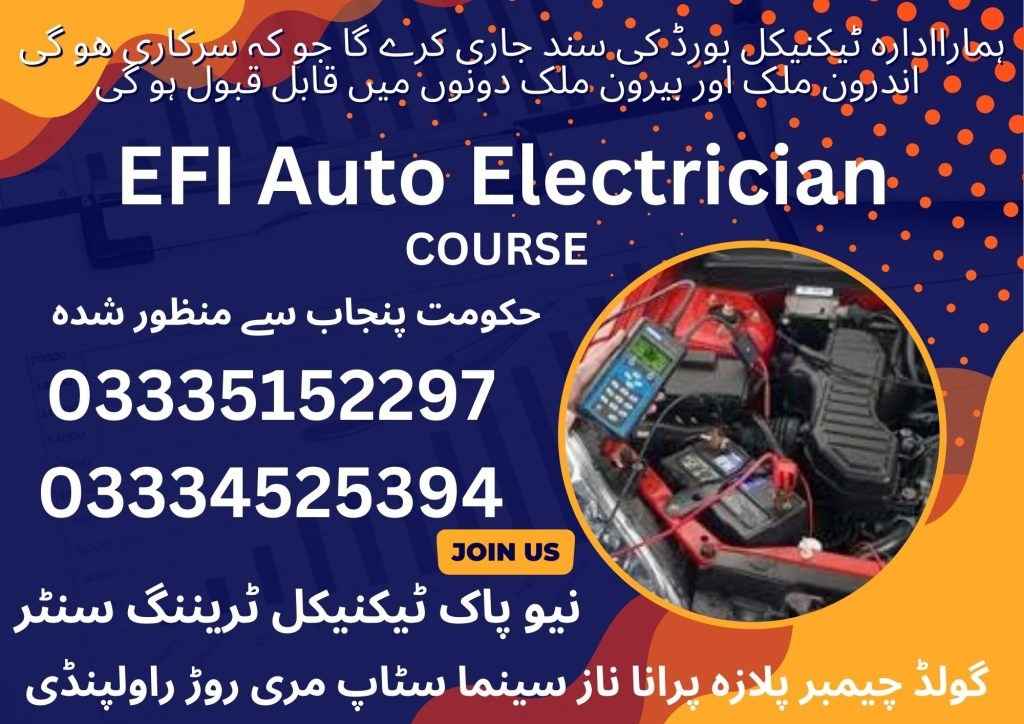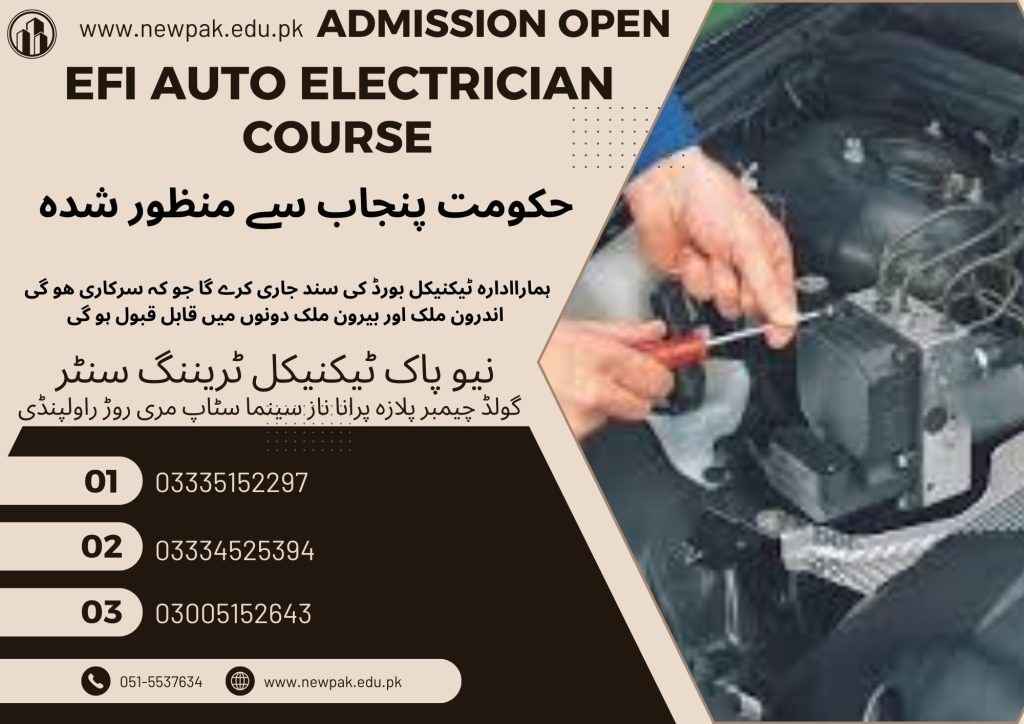
EFI Auto Electrician Course In Rawalpindi Islamabad
The EFI Auto Electrician Course trains individuals in diagnosing, repairing, and maintaining modern vehicle electrical and fuel injection systems. Learners gain in-depth knowledge of electrical fundamentals, ignition systems, EFI diagnostics, and advanced electronic modules found in today’s vehicles.
Course Overview
This hands-on EFI Auto Electrician Course in Islamabad offers a comprehensive blend of theory and workshop practice. Covering everything from basic wiring to complex ECU programming, it prepares students for real-world auto electrical challenges and a successful career in modern vehicle servicing.

Course Duration
06 | Months
- Workshop Safety & Electrical Basics
- Electrical Principles & Fluid Handling
- Battery, Starter, Alternator & Lighting Systems
- Wiring Diagrams & Tools Introduction
- Ignition Systems & Basic EFI Concepts
- Fuel System & Injector Operations
- Basic Diagnostics & DTC Interpretation
- Entry-Level Practical Troubleshooting
01 | Year
- Workshop Safety & Electrical Basics
- Electrical Principles & Fluid Handling
- Battery, Starter, Alternator & Lighting Systems
- Wiring Diagrams & Tools Introduction
- Ignition Systems & Basic EFI Concepts
- Fuel System & Injector Operations
- Basic Diagnostics & DTC Interpretation
- Entry-Level Practical Troubleshooting
- Advanced EFI Diagnostics & Tuning
- Engine Management Systems & ECM
- CAN Bus Systems & Throttle Sensor Study
- Complex Wiring Schematics & Fault Isolation
- ABS, TCM, BCM & Airbag Safety Systems
- ECU Programming & Key Coding
- Hybrid Systems Introduction
- Final Workshop, Certification & Career Guidance
Course Outline (6 Months)
Safety & Electrical Fundamentals
Month 1
- Workshop safety procedures and emergency protocols
- Use of Personal Protective Equipment (PPE)
- Introduction to electrical principles: voltage, current, resistance
- Safe work practices and handling of automotive fluids
- Basic internal combustion engine operations
Auto Electrical Systems
Month 2
- Automotive battery systems and maintenance
- Starters, alternators, and lighting systems
- Electrical circuits and wiring diagram fundamentals
- Introduction to automotive tools and equipment
Ignition Systems & EFI Introduction
Month 3
- Types of ignition systems and components
- Spark plugs, coils, and timing concepts
- Introduction to Electronic Fuel Injection (EFI) Systems
- Overview of EFI sensors, actuators, and the ECU
Fuel & Ignition Management
Month 4
- Fuel delivery system: pumps, filters, regulators
- Injector functions and cleaning methods
- Ignition troubleshooting techniques
- Wiring diagram reading and basic electrical repairs
Foundational EFI Diagnostics
Month 5
- Diagnostic tools and scan tool usage
- Retrieving and interpreting Diagnostic Trouble Codes (DTCs)
- Performing basic EFI system repairs
- Hands-on practice with entry-level fault scenarios
Practical Workshop & Assessment
Month 6
- Real-world EFI issue simulation and troubleshooting
- Hands-on training using diagnostic tools
- Final theoretical and practical evaluations
- Issuance of course completion certification
Course Outline (1-Year)
Months 1–6: Essential EFI Auto Electrician Course In Rawalpindi Islamabad
(Same course content as the 6-month program but with more detail, role-plays, software demos, and assessments.)
Advanced EFI System Diagnosis
Month 7
- Deep dive into EFI control systems and performance tuning
- Diagnostic procedures for complex faults
- Use of advanced scanners and oscilloscopes
- Interpreting complex DTC patterns
Engine Management & ECM
Month 8
- Detailed study of Engine Control Module (ECM) functions
- Throttle position sensors, IAC valves, and air-fuel ratios
- Engine performance mapping and tuning basics
- Introduction to CAN bus systems
Complex Wiring & Troubleshooting
Month 9
- Reading and analyzing detailed wiring schematics
- Diagnosing intermittent electrical faults
- Component testing methods and logic flow analysis
- Wiring harness repair and testing
Safety Systems & Control Modules
Month 10
- Overview of Airbag (SRS) and safety systems
- Working with Body Control Modules (BCM) and accessories
- Hands-on experience with ABS and TCM systems
- Best practices for handling airbags and sensitive components
Programming & Modern Systems
Month 11
- Introduction to ECU programming and reprogramming basics
- Configuration of body modules and key re-learning
- Electrical accessory installation and coding
- Exposure to hybrid vehicle electrical systems (intro level)
Specialization & Certification
Month 12
- Complex EFI issue diagnostics and repairs
- Case studies and simulated fault troubleshooting
- Final comprehensive written and practical examination
- Issuance of advanced EFI Auto Electrician Certification
- Guidance on national certification pathways and career planning

Career Opportunities
- Automotive Electrician Technician
- EFI System Diagnostic Specialist
- Engine Management System Technician
- Auto Repair Shop Technician
- ECU Programming Assistant
- Hybrid Vehicle Electrical Technician
- ABS and Airbag System Technician
- Electrical Wiring and Harness Repair Technician
- Automotive Electronics Service Advisor
- Field Service Technician for Automotive Electrical Systems
Conclusion
The EFI Auto Electrician Course in Rawalpindi Islamabad, provides practical training in automotive electrical systems, from basics to advanced EFI diagnostics and engine management. This electrical technician course equips students with skills for troubleshooting, repair, and ECU programming, preparing them for careers in vehicle service and diagnostics. For those who are interested in an industrial-level practice, our top-notch electrical training institute, NPTTC, is the best choice.






